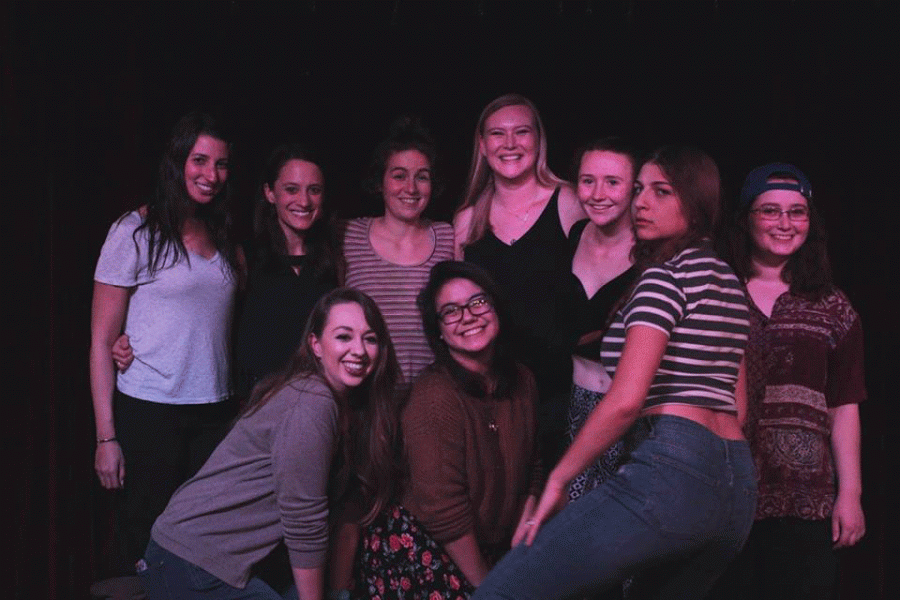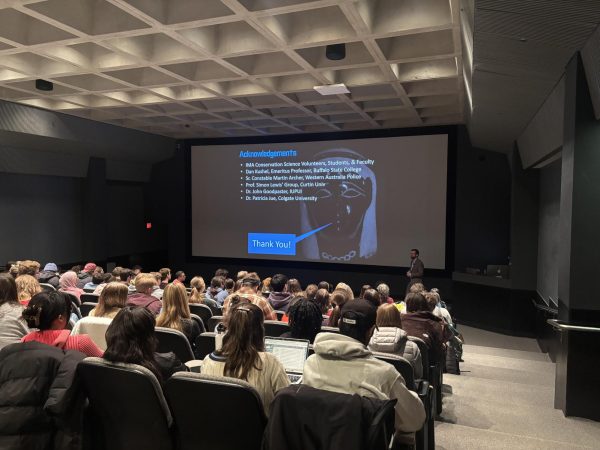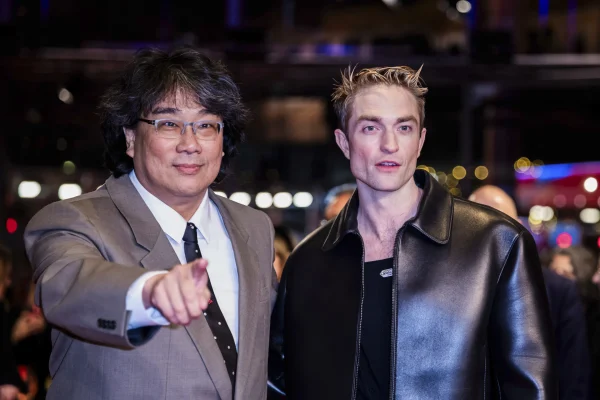‘Ladies Night’ Stand Up Comedy Show Brings Laughs
Lady comedians from Colgate and surrounding colleges took to the stage, sharing their comedy routines for a full audience.
The evening turnout for Colgate Stand Up’s “Ladies Night” was significant. I, along with many other audience members, could not find a seat, and was left to stand like the comedians. The event was hosted by sophomore Sydney Schultz, and the lineup, consisting of all female comedians, included students from our very own Colgate University, Binghamton University, Hamilton College and comedy club comedians from New York City.
The show started off with a beat-boxing performance. Immediately afterwards, Schultz introduced ladies “much funnier than her” to the stage.
Colgate’s senior Julia Cooper was the first comedian to hit the mic, and she quickly eased audiences into the show. Unafraid to voice her political opinions, she expressed concern for President Trump’s capabilities, and suggested that Secretary of Education Betsy DeVos probably thought “PEMDAS was a UN committee.”
Following Cooper was Binghamton University’s Helen Frazier, who began with an anecdote about receiving a speeding ticket, driving 83 mph in a 65 mph limit zone. Her jokes ranged from minorities to google calendars to Hurricane Sandy. The most laughter was heard with her profound statement that men like when women self-deprecate themselves, so “they don’t have to do it for them.”
New York City’s Kate Barbaro had a different energy and tone from the rest, which she described as the energy of a “mom convincing her kids to do arts and crafts.” Very open about herself, she shared funny stories from her Catholic background, as well as her “overachieving” personality. She even revealed her recovery from bulimia, which could have put a damper on the mood, but she did it with grace, calling it the “least sexy” of the eating disorders.
The next act circled back to Colgate with senior Clare Schneider, who ridiculed the idea that ghosts were “young white females,” given the historic privilege of being white. Her most memorable moment was when she sang, in a pretty decent voice, a rendition of Brahm’s Lullaby, addressed to frat boys.
Caroline Kreidberg, the President of Hamilton College’s comedy club, came up next. Pretending to praise cult leader Charles Manson, she thanked him for teaching her of the possibilities of a “career change” through his example of music to murder. She also marvelled at the impressive time achievement of those who lead double lives.
A Colgate sophomore and newcomer, Maeve Daley, attributed her low self-esteem to the fact that she “falls on the ice everyday.” In describing what a hook-up between her gangly self and another gangly tall male would look like, she compared it to “ear-phones that get tangled up in your pocket.”
Lyla Cerulli, Binghamton’s second comedian, commended the audience for not trying to guess her ethnicity, when she described herself as “half-Italian and half-Asian.” She also joked about her severe social anxiety and not wanting to “bother” her therapist with her problems. She also spoke out against rape and the benefits of being in a healthy relationship.
The last comedian, Belinda Boxer of New York City, unfortunately suffered from a lost voice, but still powered through. She relayed the interesting story of how she found out her father operated a fantasy phone sex line, but hit some nerves with her joke about how working for the federal government should give her the title “five years a slave.” The audience, it seems, was unprepared for her risqué sense of humor.
The reception was quite mixed: one student I interviewed commented that he thought the show was “pretty good,” but that Boxer’s reference to Mexicans as rapists was “uncomfortable,” and that Cerulli’s admission of her suicide attempt was a “little too intense.” Overall, the comedians of Stand Up: Ladies Night were unarguably bold, raunchy, honest and certainly did a good job of filling such a short amount of time with continuous entertainment.





